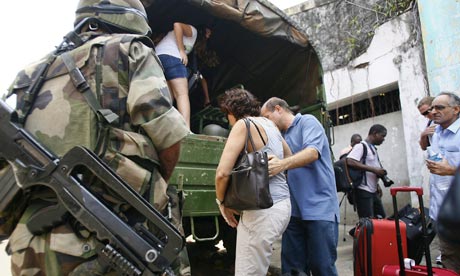Sarkozy's micro-managed intervention in Ivory Coast could win votes
The French president has avoided accusations of necolonialism in his carefully gung-ho Africa campaigns
- guardian.co.uk,
- Article history

French troops evacuate French nationals from Abidjan. Paris stresses that no French soldier was involved in the arrest of Laurent Gbagbo. Photograph: Legnan Koula/EPA
Within moments of Laurent Gbagbo's capture, French president Nicolas Sarkozy telephoned Gbagbo's rival, Alassane Ouattara, the internationally recognised winner of last year's election.
Initial reports suggested that French troops had carried out the arrest, but they were immediately denied in Paris: French troops had not arrested Gbagbo, he had been handed over to them by his own presidential guard.
Then more reports: Ouattara's forces had arrested Gbagbo. And finally: French forces helped the rebels, but no French soldier had set so much as one boot on Gbagbo's lawn.
The way Paris tells it, French and United Nations forces laid siege to Gbagbo's residence and reduced part of the building to rubble with tank and helicopter missiles in an attempt to take out "heavy weaponry".
Then they stopped and waited for Ouattara's forces to go in. This scenario, if true, is the best Sarkozy could hope for: the French had saved the day but had not been seen to deliver the final coup de grâce, which could have prompted charges of neo-colonialism.
In recent weeks Sarkozy has miraculously recovered from France's diplomatic disasters in North Africa. His foreign policy had been dismissed as "diplomacy without courage" after Paris initially offered to help crush unrest in Tunisia.
With a presidential election a year off – and his popularity ratings at all-time low – Sarkozy had to do something. First he led the way into Libya, driving through a UN resolution that would let French warplanes loose and make everyone else – except perhaps David Cameron – look indecisive.
Emboldened, France obtained a similar UN resolution allowing its Operation Licorne forces in the Ivory Coast to act "in defence of civilians", which in practice meant support for Ouattara.
Licorne was beefed up to 1,400 troops, who immediately took control of Abidjan airport and began patrolling the city while French "intelligence operatives" were rumoured to be in the country.
Sarkozy was said to be in regular contact with Ouattara – over whose marriage he officiated when mayor of Neuilly – and reportedly managed the conflict in minute detail. It was Sarkozy who reportedly told Ouattara to hold back the attack on Gbagbo for fear of turning him into a martyr, and Sarkozy who allegedly refused to allow French troops to take control of Abidjan's bridges, even though it would help the evacuation of civilians. Photographs of the French flag flying over the Charles de Gaulle bridge at the heart of a former colonial capital would not, he decided, send the right message to Africa.
At each step, Paris insisted military action was preceded by a formal demand from the UN for French forces to act, and both France and the UN insisted their aim was not to overthrow Gbagbo. But last night the big question over Gbagbo's arrest remained, as Le Monde asked: "At what point did French forces intervene?"
The French ambassador in Abidjan, Jean-Marc Simon, insisted that "at no moment" did any French troops enter "into the gardens or the presidential residence". The paper quoted a defence ministry source admitting the French and UN forces had been "supporting the operation" to arrest 65-year-old Gbagbo.
The point over who actually arrested Gbagbo may seem pedantic, but Sarkozy has been treading a fine line between being damned for intervening – accused of neo-colonialism and of attempting to boost his domestic ratings with battlefield successes – or damned for sitting back and doing nothing. Inaction is not Sarkozy's default position – particularly in the Ivory Coast, which is home to 15,000 French citizens.
Le Figaro has suggested Sarkozy's war adventures could indeed be a vote-winner: "The president of the republic thinks the French experience a certain pride in seeing their country play an important role on the world scene and that this role is recognised outside its borders. It's good for morale," the paper said.
No comments:
Post a Comment